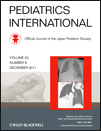Pulse steroids as induction therapy for children with ulcerative colitis
Abstract
Background: Corticosteroids therapy, classically the first-line treatment for ulcerative colitis (UC), often causes serious side-effects. Theoretically, pulse steroid therapy where high doses are given for a shorter period may have maximal beneficial effects and minimal side-effects as induction therapy for UC. We have therefore retrospectively compared induction therapy using pulse steroids with conventional steroid treatment for children and adolescents with moderate-to-severe UC.
Methods: We utilized conventional steroid treatment (prednisolone 1–1.5 mg/kg/day) as an induction treatment in 17 UC patients between 1985 and 2006. Alternatively we used a 3-day megadose pulse steroid therapy (methylprednisolone intravenously 20–30 mg/kg/day, max. 1000mg/day) in 20 UC patients from 1993 to 2006.
Results: Pulse steroid therapy successfully induced rapid remission in UC patients with moderate-to-severe disease compared with conventional treatment (13.2 days vs 25.1 days; P < 0.05). The amelioration of Pediatric Ulcerative Colitis Activity Index score between before and 1 week after pulse steroid therapy was significantly more than that of conventional treatment (P < 0.01). No serious adverse effects were observed in the patients treated with pulse steroid therapy. However, the rate of the relapse episodes during the next 12 months after pulse steroid therapy was not significantly different from that after conventional treatment.
Conclusion: These findings suggest that pulse steroid therapy is an option to be considered in children with moderate-to-severe UC.




